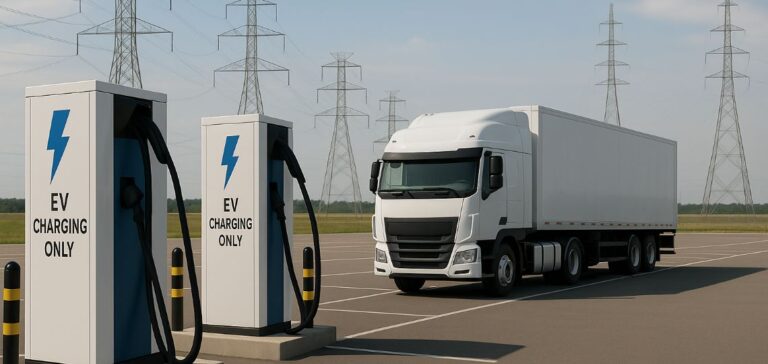After sixteen months of experimentation, a corridor dedicated to road freight transport by electric trucks is now operational between Avignon and Lille. This project, led by Sanef, Engie and Ceva Logistics, covers 900 kilometres and is based on a relay system inspired by historic postal routes.
A network of strategic relay stations
The route is divided into four main segments, with five relay stations located in Avignon, Lyon, Dijon, Sommesous and Lille, spaced 200 to 300 kilometres apart. Each station is equipped with specific facilities, such as in Sommesous on the A26 motorway, where two fast-charging stations for heavy goods vehicles have been installed. At each stop, an electric truck detaches its trailer and transfers it to another truck ready to continue the journey.
The model allows vehicles to bypass the limitations related to electric autonomy over long distances. “The use of electric trucks on motorway segments of about 300 km makes it possible to bypass operational autonomy constraints,” stated Sanef, Engie and Ceva Logistics in a joint statement.
Optimisation of logistics operations
According to Engie, the relay station also allows for significant time savings. “As there is no need to wait for the truck to charge, since the trailer leaves immediately, there is 25% less time compared to a diesel truck trip that has to stop,” explained Clémence Fischer, Managing Director at Engie-Vianeo, the Engie subsidiary responsible for the deployment of charging infrastructures.
The system also foresees an improvement in working conditions for drivers, who can return to their point of departure each day. “The driver leaves from where he started, and returns home in the evening,” said Ms Fischer, highlighting an advantage in a sector facing a labour shortage.
Extension prospects and public support
The project could extend to other major roadways in France, subject to the progressive electrification of truck fleets and the installation of new relay stations. The three operators stated that the development of the corridor will require public support, particularly for the financing of future infrastructures.
The Avignon-Lille corridor thus marks a key stage for the integration of electric solutions into long-distance freight transport in France.






















